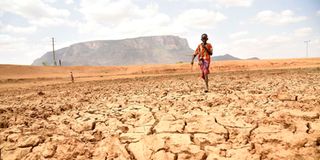Plan to give out toxic food lands Samburu County in trouble

A herdsboy walks on a dry dam at Lerata in Samburu East. Samburu is had hit by drought but the county has stocked for distribution maize flour that was blacklisted for toxicity.
Samburu County Government is on the spot following reports that it intends to distribute tonnes of toxic maize flour that has been recalled from the market by the Kenya Bureau of Standards (Kebs) for failing to meet quality standards.
The Nation has learnt that Governor Moses Lenolkulal is planning to distribute the Tupike maize meal brand, which was banned by the standards body, to hunger stricken families across the county.
Kebs earlier blacklisted 27 maize and porridge flour brands after they failed to meet quality standards. The maize meal brands include: Tupike, Budget, Equatorial Ugali Afya, Fahali, Family and Pembe. Others are Sima Tamu, Ugali Bora, Unga Sawa, Uwezo and Ziwa.
Blacklisted porridge brands include Soko Wimbi Mix, Winnie’s Pure Health-Ugali Afya, Greenhouse Pride Polished Wimbi with Milk Powder among others.
The standards body further said that all blacklisted manufacturers should cease production and sale of the affected products and recall those already in the market.
Stocked warehouse
When we gained access to the NCPB warehouse in Maralal, the Tupike maize meal brand was fully stocked ready for distribution to vulnerable families who are starving from hunger.
Samburu County Special Programmes Chief Officer Daniel Lesaigor failed to answer a question on whether they are going to distribute the unfit maize meal or dispose of it. He instead maintained that the county and the national government together with development partners have taken measures to help mitigate biting hunger in the affected areas. The official told the Nation that there were some 253 metric tonnes of flour at the depot that was meant to serve a population of 36,000.
"We had mapped out about a population of 36,000 across the entire Samburu County in March and April. But as the drought continued, we realised more than 100,000 urgently needed help," Mr Lesaigor said.
As the famine continues to bite with inaction from the authorities drawing anger from the public, the official defended the county administration’s interventions saying that they have completed cash transfers in several villages.
"We set aside cash to help mitigate the impacts of drought across Samburu. Distribution of relief foods is ongoing across the affected areas," Mr Lesaigor said.
In Samburu East, one of the worst hit areas, water, pasture and food stocks ran out several months ago and thousands are facing starvation. Women, the elderly and children are hardest hit because of their limited movement.
Critical moment
Samburu East MP Jackson Lentoijoni expressed anger on why the county had tonnes of cereals in store while people are starving. The legislator said Samburu East needs urgent help to support human and animal lives.
“This is a critical moment and as leaders we appeal for a relief food to cushion starving locals," Lentoijoni said.
The MP noted that the drought has triggered ethnic clashes over control of water points and grazing fields. More than 12 counties in Kenya are affected by a prolonged drought, according to the National Drought Management Authority (NDMA).
The dry spell has been triggered by unstable rains for the past few months and water tables in affected regions have gone down drastically.
Water scarcity is also forcing population migration in the northern areas of Turkana, Samburu, Isiolo and Marsabit. The areas hard-hit by drought are experiencing severe food shortages, massive population displacement and deaths from conflict over control of water points and pasture.
At least two deaths as a result of starvation have been reported.





